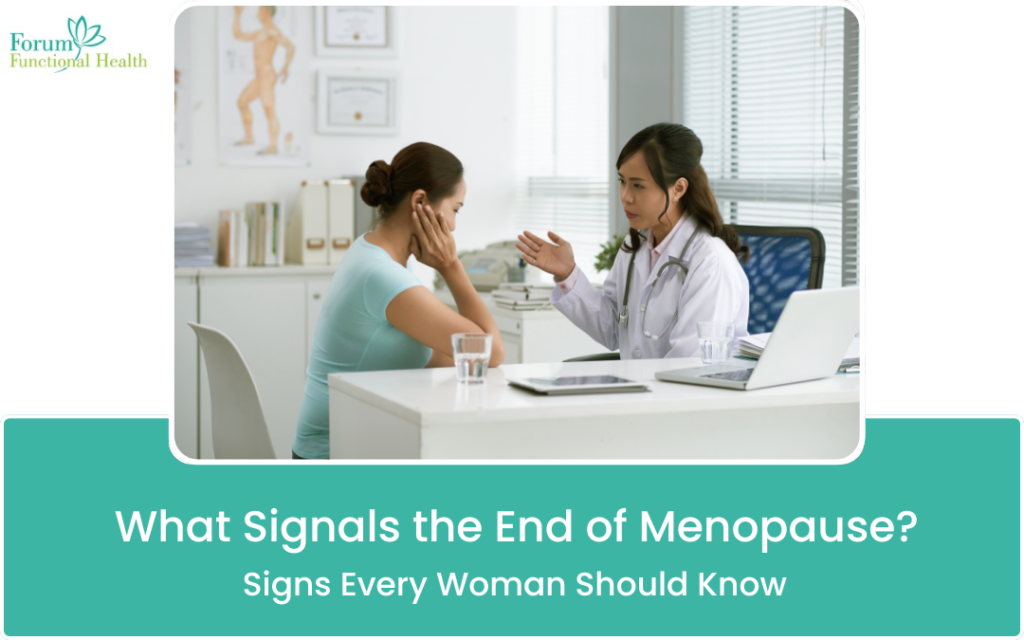What Signals the End of Menopause? Signs Every Woman Should Know

Menopause is a natural phase in every woman’s life, marking the end of menstrual cycles. It’s a significant transition, and understanding its conclusion is essential for navigating this period with confidence. At Forum Functional Health Center, we recognize the importance of this phase and provide comprehensive support for women in McKinney, Texas. This blog will help you identify the key signs signaling the end of menopause, ensuring you’re well-informed and prepared.
Understanding Menopause: A Brief Overview
Menopause typically occurs in women between the ages of 45 and 55, signifying the end of reproductive years. The process involves three stages:
- Perimenopause: The transitional period leading up to menopause, where hormonal fluctuations begin.
- Menopause: Defined by the absence of menstrual periods for 12 consecutive months.
- Postmenopause: The years following menopause, where symptoms gradually ease.
Identifying the end of menopause can be challenging, but several signs can indicate this transition.
Primary Signs of Menopause Completion
1. Stabilized Hormone Levels
As you near the end of menopause, your hormone levels—primarily estrogen and progesterone—begin to stabilize. This stability can lead to a reduction in symptoms like hot flashes and night sweats, providing a sense of relief.
2. Regular Sleep Patterns
One of the frustrating symptoms of menopause is insomnia. However, as menopause concludes, many women find that their sleep patterns improve, leading to more restful nights.
3. Decreased Frequency of Hot Flashes
Hot flashes and night sweats tend to diminish in frequency and intensity as you transition out of menopause. This change is a positive indicator that your body is adjusting to its new hormonal balance.
4. Improved Mood Stability
Mood swings, irritability, and depression are common during menopause due to hormonal changes. However, as hormone levels stabilize, many women experience improved emotional well-being and mood stability.
5. Weight Management Becomes Easier
Weight gain during menopause can be challenging to manage. As menopause ends, metabolism tends to stabilize, making it easier to maintain a healthy weight with regular exercise and a balanced diet.
The Role of Functional Health Centers
At the Functional Health Center in Texas, we offer personalized care to help women manage their menopause symptoms effectively. Our holistic approach ensures that you receive the best possible support during this transition.
Seeking Professional Support
If you’re experiencing severe or persistent symptoms, seeking professional support is crucial. The Forum Functional Health Center provides specialized menopause treatment in McKinney, Texas, ensuring you receive the care and guidance you need.
Coping with the End of Menopause
Navigating the end of menopause can be emotionally and physically taxing. Here are some tips to help you cope:
- Stay Active: Regular physical activity can help manage weight, improve mood, and promote overall health.
- Maintain a Balanced Diet: Eating a diet rich in fruits, vegetables, lean proteins, and whole grains can support hormonal balance and overall well-being.
- Stay Connected: Emotional support from friends, family, or support groups can make a significant difference in how you cope with the changes.
- Practice Stress-Relief Techniques: Techniques like yoga, meditation, and deep breathing can help reduce stress and improve emotional well-being.
Conclusion: Embrace the New Phase
The end of menopause is a significant milestone, marking the beginning of a new phase in life. Recognizing the signs and seeking support from professionals like those at the Functional Health Center in McKinney can make this transition smoother and more manageable.
For comprehensive care and guidance, Contact Forum Functional Health Center for expert menopause treatment in McKinney, Texas. Embrace this new phase with confidence and clarity, knowing that support is always available.
Read More:- What to Expect During Premenopause, Perimenopause, and Menopause
